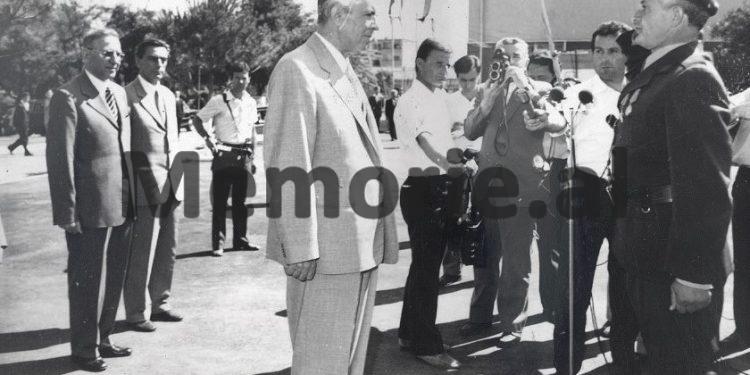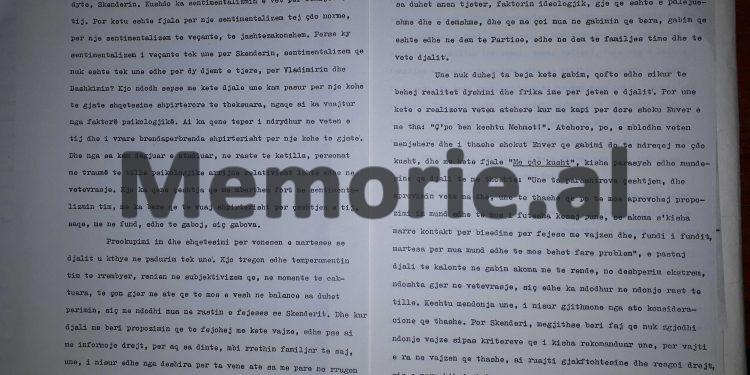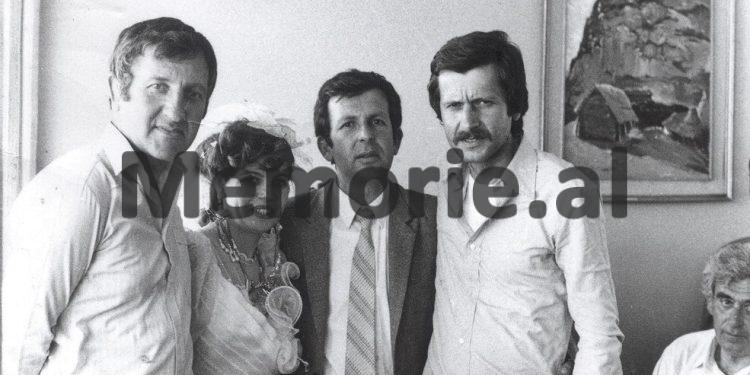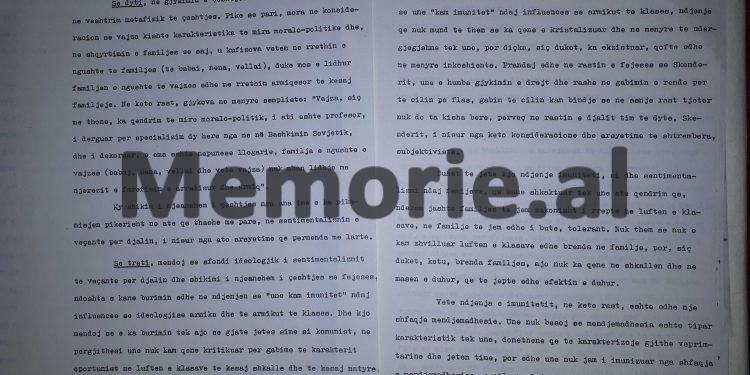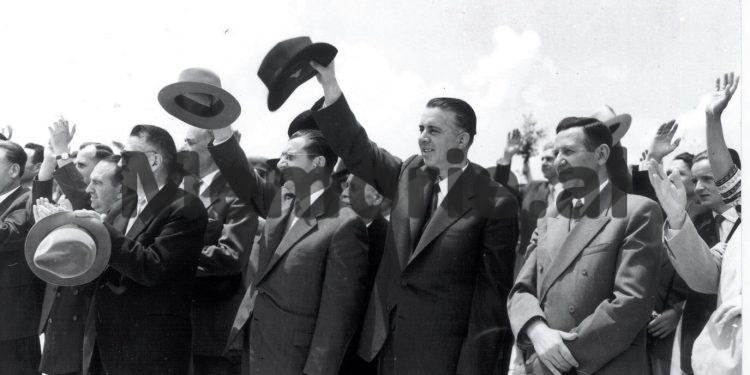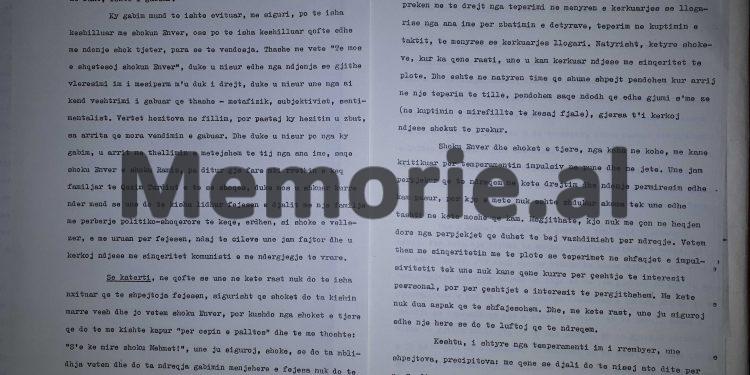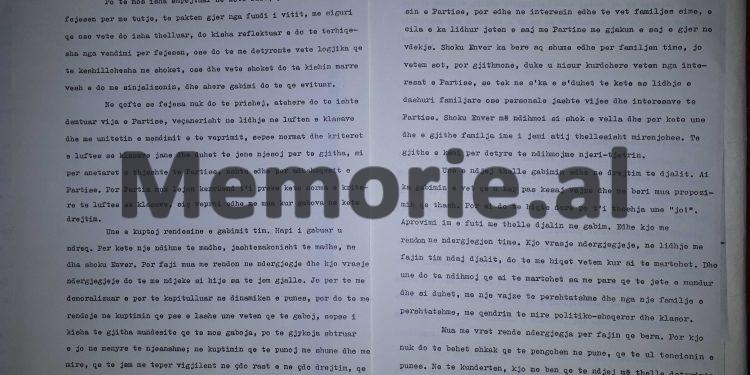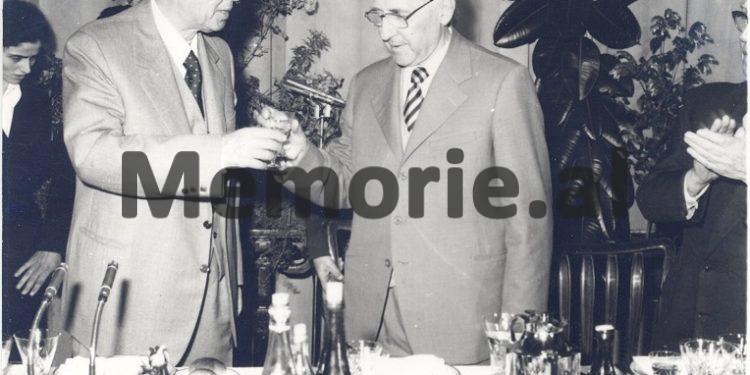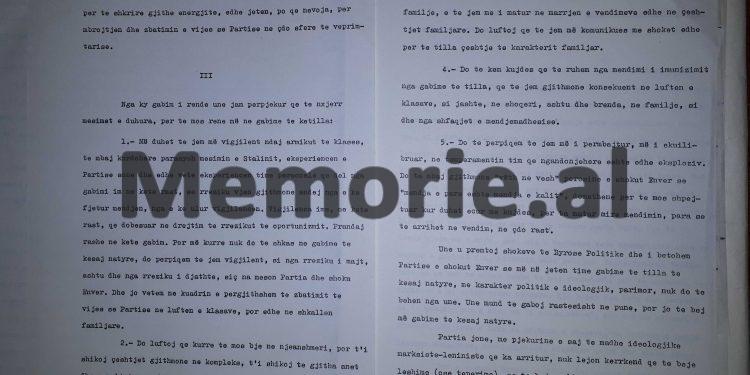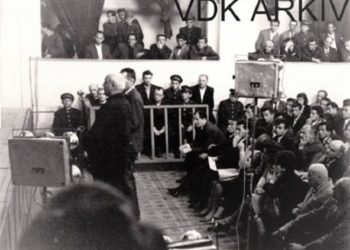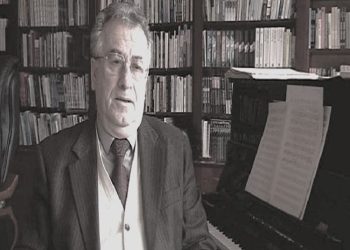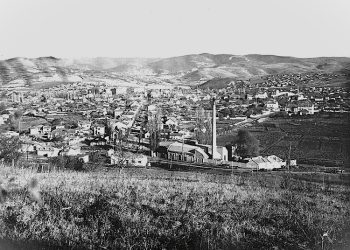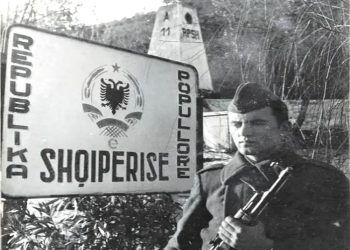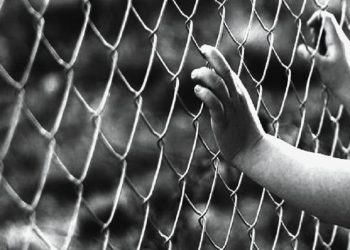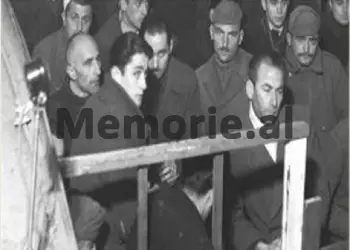Dashnor Kaloçi
Part seventeen
Memorie.al publishes some documents issued by the Central State Archive (fund of the former Central Committee of the ALP), where there is a voluminous file with archival materials which bear the logo ‘Top secret’, which belong to the period of years 1981-1982, with reports, reports, evidence, information, minutes of the meetings of the Politburo and the secretariat of the Central Committee of the ALP, etc., starting from what was held to review and analyze the self-criticism of the former Prime Minister Mehmet Shehu in December 1981, for allowing the engagement of his son, Skënder, “with a girl who had some political fugitives in her family circle”, the marathon meeting of the Politburo on the afternoon of December 17 his year that continued until the late hours of that night, where that problem was discussed with the debates and discussions of all members who “crucified” former Prime Minister Shehu, the meeting of the morning of December 18, after the news that Prime Minister Mehme t Shehu had killed himself, the marathon meeting of the Secretariat of the Central Committee of the ALP on September 20, 1982, with the topic: “Analysis of serious mistakes of Kadri Hazbiu, committed during the period when he was deputy minister and minister of Internal Affairs “, where Enver Hoxha initially launched accusations against Kadri Hazbiu, luring him as a” loyalist of the Party “, (in order for him to” open the heart of the Party “, speaking against former Prime Minister Mehmet Shehu) , where at the beginning of his speech, Enver said: “After the coup in the army, we discovered the traitorous group in economics of Abdyl Këllez, Koço Theodhos and Kiço Ngjela with friends. We also discovered this group here; it was not discovered by the State Security. The same can be said about the discovery of the group of Fadil Paçrami, Todi Lubonja and a number of other people connected with them, such as Ismail Kadareja with friends, the Security did not reveal, but that hostile work was discovered by the Committee Central ”, etc.! All these and other documents with the logo ‘Top secret’, will be published in several issues in a row, exclusively by Memorie.al
Continued from the previous issue
The ‘Top Secret’ document with the self-criticism of former Prime Minister Mehmet Shehu, sent to Enver Hoxha and the Political Bureau of the Central Committee of the ALP, regarding the engagement of his son, Skënder, to “a girl with a very bad political composition”!
Top secret
“Draft-self-criticism” (“First self-criticism”) that Mehmet Shehu sent to comrade Enver Hoxha and “Autocriticism” (second variant) to comrade Enver Hoxha and comrades of the Politburo of the Central Committee as well as the minutes of the meeting Politburo of the Central Committee of the ALP, dated 17 – 18 December 1981: For the analysis of the serious mistake made by the former member of the Politburo, Mehmet Shehu, regarding the engagement of a boy with a girl with a very bad political composition . (Dt. 17-18. XII. 1981)
First, there is my pronounced sentimentality about my second son, Skënder. Everyone has their own sentimentality for their children. But here it is about sentimentality beyond any norm, about a special, extraordinary sentimentality. Why this special sentimentality to me about Skënder, sentimentality that is not to me for the other two boys, Vladimir and Bashkim?
This is because with this boy I have had for a long time pronounced spiritual concerns, because he has suffered from psychological factors. He has been incredibly repressed in himself and killed internally spiritually for a long time. And from what I have heard and studied, in such cases, people with such psychological trauma, reach relatively easily even to suicide. This has been the issue that has gripped me so much in my sentimentality; it has made me suffer spiritually for his issue, so much so that, finally, I also make mistakes, as I did.
My preoccupation and concern about the boy’s marriage delay turned to me impatiently. This also shows my abducted temperament, the decline in subjectivism that, at certain moments, leads to the fact that I do not balance the principle enough, as happened to me in the case of Skënder’s engagement. And when the boy proposed to me to get engaged to this girl even though he informed me right, as far as he knew, about her family circle, I also started from the desire to put him as soon as possible on the marital path, but also from fearing that I would cause him some trauma, if I did not give his consent, I decided to approve his engagement.
Here I fell into the overestimation of the subjective side, started from that to help the boy and did not deepen and did not balance enough the other side, the ideological factor, which is impermissible and harmful and which led me to the mistake I made, the mistake that is both to the detriment of the Party and to the detriment of my family and my own son.
I should not have made this mistake, even if my doubts and fears about the boy’s life became a reality. But I realized this only when my friend Enver took me by the hand and said: “What is Mehmet doing like this”! Then, I immediately gathered myself and told Comrade Enver that the mistake would be corrected at all costs and with this word: “at all costs”, I also had in mind the possibility that the boy would say to me:
“I submitted the issue and the approval myself and, I told you that if my proposal was not approved, I might not have entered this work, because I had not yet contacted for talks about the engagement with the girl and finally, the marriage. for me it may not even become a problem at all ”, and then the boy would go into an even more serious mistake, in extreme despair, maybe even to suicide, as has happened in any such case.
So I thought, always starting from those considerations I said. But Skënderi, although he was guilty of not choosing a girl according to the criteria I had recommended, but went and fell on the girl I said, he maintained his composure and reacted correctly, as Enver foresaw and not as such an extreme possibility was thought. , with my unrealistic, sentimental and subjectivist sponsorship.
Second, in judging the case I fell into a bias, with a metaphysical look at the case. First of all, I considered that the girl had good moral-political characteristics and in considering her family, I limited myself to the close circle of the family (father, mother, brother), not linking the girl’s close family even with the hostile circle of this family.
In this case, I judged in a simplistic way: the accountant, the girl’s close family, has no contact with the fugitive relatives and enemies.
This one-sided view of the issue on my part has its starting point, exactly in what I said before, in the special sentimentality for the boy, based on those excuses that I mentioned above.
Thirdly, I think that the ideological background of the sentimentality specific to the boy and the one-sided view of the engagement, probably have their source in the feeling that “I have immunity”, to the influence of hostile ideology and the enemy of the class. And this I think I have the source in what during my life as a communist, in general I have been criticized for mistakes of an opportunistic character in the class struggle of this degree and of this nature, such as this mistake of mine, already in connection with the engagement of the second son.
And this, in one way or another, perhaps deep inside me, has created a certain thought and feeling, that “I have immunity”, to the influence of the enemy of the class, a feeling that I cannot say has been crystallized and consciously to me, but something, it seems, has existed, even unconsciously.
Therefore, even in the case of Skënder’s engagement, I lost the right judgment and fell into the grave mistake I am talking about, a mistake which, I am convinced, I would not have made in any other case, except in the case of the boy my second, Skënder, based on these distorted, subjectivist considerations and reasoning.
It must be this sense of immunity, as well as sentimentality towards the children, that has caused me to have that attitude that, while outside the family I am usually strict in the fight against cashews, in the family I am also gentle, tolerant. I am not saying that I did not develop the class struggle even within the family, but, as it seems, here within the family it has not been to the right degree and extent, to give the right effect.
The very feeling of immunity, in this case, is also a display of arrogance. I do not believe that arrogance is a characteristic feature of me, that is, to characterize all activity and my life, but I too am not immune from the display of arrogance, which in this case was manifested in my wrong judgment, for the engagement of a boy to a girl from such a family circle thinking that my judgment is right, when in fact it is wrong.
This mistake could have been avoided for sure, if I had consulted with Comrade Enver, or if I had consulted even with another Comrade, before deciding. I said to myself “not to bother Comrade Enver”, starting from the feeling that all my above assessment seemed right to me, starting from the wrong point of view that I said – metaphysical, subjectivist, sentimentalist . I really hesitated at first, but then this hesitation subsided, until I managed to make the wrong decision.
And starting from the same mistake, I reached a further deepening of it, so much so that Comrade Enver and Comrade Ramiz, knowing nothing at all about the bad family circle of Qazim Turdi and his wife, did not go I never thought that I would have tied the boy’s engagement to a family with a bad socio-political background, they came as friends and brothers and congratulated me on the engagement, to which I am guilty and I apologize with communist sincerity and conscience to killed.
Fourth, if in this case I had not rushed to speed up the engagement, surely the friends would have found out and not only Comrade Enver, but any of the other friends who would have caught me “for the corner of the coat “, And to say to me:” That you are good friend Mehmet “!, I assure you friends, that I would gather myself and correct the mistake immediately, and the engagement would not have been done. But I was in a hurry. I was in a hurry from my abducted temperament, which sometimes leads me to exaggeration.
From time to time, this impulsivity has appeared during my work to such an extent that it has happened that special friends have been affected by the excess in the way I ask for an account, for the implementation of tasks, excesses in the sense of tact, the manner of requesting the account.
Of course, to these friends, when it was the case, I apologized, with high sincerity. And it is in my nature that I quickly regret when I reach such an exaggeration, I regret so much that it happens that even sleep does not bother me, until I apologize to the affected friend.
Comrade Enver and other friends, from time to time, have criticized me for my impulsive temperament at work and in life. I have tried to correct myself in this direction and I have had some improvements, but this defect has not disappeared from me even now at this age. However, this does not lead me to give up the efforts I have to make constantly, to correct.
I just say, with the utmost sincerity, that the excesses in the causes of impulsivity in me, have never been for matters of personal interest, but for matters of general interest. With this I do not want at all to be excused. On this occasion, I assure you once again that I will fight to make amends.
Thus, driven by my abducted temperament, I hastened, precipitated: since the boy would leave in those days for Sweden, to continue his studies, I said that it would be good for the engagement to take place before he left. And so by haste, precipitation by evil, materialized.
If I had not rushed in this case, but had left the engagement for further, at least until the end of the year, surely, either I would have deepened myself; I would have reflected and withdrawn from the engagement decision. Either logic itself would force me to consult with friends, or friends themselves would have found out and signaled to me, then the mistake would have been avoided.
If the engagement had not been broken, then the Party line would have been damaged, especially with regard to the class struggle and the unity of thought and action, because the norms and criteria of the class struggle are and should be the same for all, both to ordinary members of the party and to its leaders. But the Party does not allow anyone to touch these norms and criteria of class struggle, as it did with me when I erred in this regard.
I understand the importance of my mistake. The wrong step was corrected. For this, a great, extremely great help has been given to me by Comrade Enver. But guilt weighs on my conscience, and this murder of conscience will haunt me as long as I live. Not to demoralize me and to capitulate to the dynamics of work, but it will weigh on me in the sense of why I left myself to make mistakes, because I had every opportunity not to make mistakes, if I judged openly and not unilaterally in the sense of working harder and better, of being more vigilant, in every case and direction, of never making mistakes of this nature again. I will have to work with all my strength and energy, until I close my eyes, to wash away this guilt from the Party.
I am eternally grateful to Comrade Enver, who, upon learning of the matter, immediately acted properly, in the interest of the Party, but also in the interest of my own family, which has connected its life with the Party. Comrade Enver has done so much for my family, not only today, but always, always starting only from the interests of the Party, that we do not have and should not have, nor family and personal ties and love abroad line and interests of the Party. Comrade Enver helped me as a friend and brother and for that, I and my whole family are grateful to him. We all have a duty to help each other.
I deeply feel the mistake also in the direction of the boy. He has his own fault that he caught up with this girl and made me the proposal I said. But he would have given up if I had said no!
My approval plunged the boy deeper into error. This murder of conscience, in connection with my guilt towards the boy, will be removed from me only when he marries. And I will help him to get married as soon as possible, with a suitable girl and from a suitable family, with good political-social and class attitude. Memorie.al
The next issue follows




